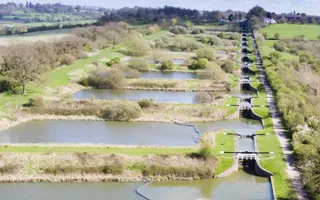Read our interview with Alistair Lobban, civil engineer, to hear about the work he does and the skills he needs.
What do you do at work on an average day?
Lots of design meetings. I am currently leading the design on a number of the Trust's big reservoir projects including Toddbrook so I am often reviewing the designs of either our external consultants or those of my own team ensuring they are safe, buildable, cost effective and meet the requirements of the Trust. If I am not in meetings online, I will be visiting site to see the work on the ground or getting on with my own design work which can be anything from a simple waterway wall repairs through to replacing a valve at the bottom of a reservoir.
What do you like about working in this role?
The range of structures which the Trust owns is very varied and as such so are the projects. This means there is always something new to learn and apply my skills and knowledge too which keeps the job feeling fresh and interesting.
What challenges do you face in your job?
The biggest challenge is ensuring that I provide sufficient support and guidance for my team member who are developing in their own careers. This is a serious commitment but a crucial part of the role and one which I was so fortunate to benefit from while I was working towards my own Chartership.
What skills do you think you need to do this job?
An ability to solve problems, good communication, team management skills and a broad understanding of various civil engineering principles such as hydraulics and hydrology, structures, and geotechnics.
What is a typical career path for this role?
A typical career path is to first complete A-Levels in Maths and Physics and progress on to university to study a degree in Civil Engineering. Typically to become a Principal Engineer you need to be Chartered with an appropriate body such as the Institution of Civil Engineers so following graduation you would typically start out your career as a Graduate Engineer on a training agreement working towards this. Following Chartership you would normally move into a Senior role but in some instances depending on knowledge and experience you may be able to progress directly to Principal as I did myself.
What did you do in your past that helped you to get this job?
I was proactive about putting myself forward for the harder more difficult jobs that others shied away from or deliberately looking for projects that would further my knowledge and understand that were different from what I had worked on before. In some instance this involved moving employer which was how I ended up coming to the Trust in the first place.
Do you think this job will change in the future? If so how?
The role has already change significantly since I became a Principal Engineer. Now that we are working more from home the boundaries of where we work and who we manage has change, the role has become more national in terms of where projects are spread but also more local all at the same time with less day-to-day travel. The role will undoubtedly continue to embrace advances in technology to aid design and construction. However, the basic need to lead and co-ordinate a design team to deliver projects for the Trust will always be needed.





